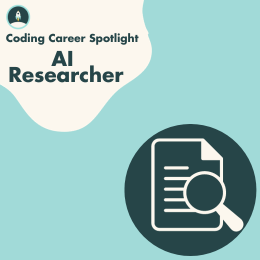Coding Career Spotlight: AI Researcher

Artificial intelligence is transforming everything from healthcare to transportation. As AI continues advancing at a rapid pace, AI research has become one of the most exciting and promising tech career paths. If you love puzzles, have a curious and analytical mind, and want to work on cutting-edge technology - becoming an AI researcher could be a great fit.
As an AI researcher, you would get to develop innovative machine learning models and algorithms. This involves experimenting with neural networks, studying how systems can learn from data, and creating new architectures that could power the next generation of AI. The end goal is to enable machines to see, hear, move, reason and react more like humans.
A common misconception is you need a PhD to work in artificial intelligence. While pursuing higher education can be beneficial, many top tech companies are keen to hire self-taught AI experts as well. For example, Elon Musk learned rocket science from reading books - not formal training! With abundant online courses and codings bootcamps available today, motivated coders can learn directly from leading AI researchers.
Once you have a strong grasp of subjects like linear algebra, probabilities, ethics and Python or Tensorflow - you’ll be ready to apply for AI roles. Entry level positions include machine learning engineers, data scientists and AI assistants. With some experience under your belt, you could progress to senior researchers designing novel neural networks or leading a team of engineers.
The future growth potential for AI experts is tremendous. As more companies realize AI’s transformative potential, demand for rare AI talent is skyrocketing. Average salaries are already over $200k for engineers with the right skillsets. Beyond compensation, the joy of creating new algorithms that push boundaries of what’s possible makes this one of the most rewarding career paths.
Here are a few key ways that learning to code can help set you on the path to becoming an AI researcher:
- Coding builds core technical abilities needed for AI work such as programming, math, and analytical thinking. Mastering languages like Python and R provides the tools to start implementing machine learning algorithms. Mathematical maturity through coding also allows you to understand AI concepts.
- Coding enables you to start experimenting with AI on your own early on. You can create prototypes and models to build hands-on experience with neural networks. This portfolio of projects can prepare you for more advanced AI development in the future.
- Coding teaches you how to break down complex problems and think computationally. These critical thinking skills are invaluable for conducting effective AI research. You learn how to systematically approach problems, troubleshoot issues, and iterate on solutions.
- Coding allows you to analyze and manipulate data programmatically. As most modern AI relies heavily on data, knowing how to wrangle, preprocess, and extract insights from data at scale is a must. These data fluency skills enable you to train performant machine learning algorithms.
- Knowing how to code allows you to implement novel AI research ideas on your own. This helps test new theories and models to push the field forward. Being able to rapidly prototype is critical for innovation in such a fast-moving field.
In summary, coding equips you with many of the prerequisites for conducting impactful AI research. The hands-on experimentation, computational rigor, and creative confidence that coding provides allows you to effectively build the artificial intelligence of the future. The earlier you start coding, the more prepared you'll be!
If you'd like your child to get started coding today, visit our classes page to find a class near you!